#a player with agency in this conflict
Explore tagged Tumblr posts
Note
hey the post you made abt the israeli/palestine conflict is so much more conplicated than tumblr "activists" are making it out to be is literally so correct and so fucking important to have been said thank you so much
@manicpoetic Thanks so much! I'm really glad I made it. While I was typing I was like what am I even writing this for no one is gonna read it especially the people who probably need to bc it's longer than 3 sentences....but it has gained more traction than I had expected which has been encouraging.
I really am not an expert but that's sort of the point, like... I have read the news every day for at least the past 6 years and have read almost every article several newspapers have published on this conflict in that time, and I am still not sure of all the details nor do I think my stupid takes would be very helpful to anyone. Yet I knooooow I am more informed than Steven Universe Blogger #77 who is suddenly very confidently advocating for terrorist organizations and comically oversimplified solutions?? Like man some people on this site really need to learn to get humbled. Not every issue can be simplified down to a 3 sentence text post and you in your college dorm are probably not coming up with solutions that haven't been considered by international organizations. Some stuff is simple, yeah, and sometimes it really is just that the powers that be won't adopt these solutions. But there are still a lot of aspects to most issues that aren't being discussed on social media, and a lot of the time people refuse to engage with the fact that The Powers That Be do exist whether we like them or not.
Willing the roadblocks to solutions away through text posts isn't going to happen, like, ever, and there are some issues that can't be solved through mass social media campaigns just to shift public opinion. The confidence with which people make really violent and reductive posts without doing the bare minimum of research on what they are talking about is really alarming, and the whole "I'm not reading all that 😂🤪" attitude about anything that challenges the 2 sentence quippy slogan they reblogged is doing serious damage.
Anyway, sorry to write a whole nother essay, but it is nice to hear some people are pushing back against this kind of simplified thinking. Not everything is a sports team type game and not everyone engaging with an issue beyond hashtags is trying to obscure The Truth. Like some people just really need to accept the fact that just because you refuse to educate yourself on a topic doesn't mean there is nothing to learn.
#gingerswagfreckles#i/p#i/p conflict#israel#palestine#israel palestine conflict#like one example is that post going around being like. omggg the leaders of hamas r in qatarrrrr why doesnt israel just extradite themmm 🙄#like. as if no one tried that? lol#this is not to say that anything that is happening rn in gaza is remotely justified bc it is not. the israeli gov is committing genocide#but when people act like they just thought of an obvious solution....without considering like hey u know...the government of qatar is also#a player with agency in this conflict#and they dont have the best relationship with israel rn.....perhaps there is a reason the leaders of hamas chose to live there??#it just really shows that a lot of people are not thinking beyond their social media feed at all
8 notes
·
View notes
Text
stg, being an enjoyer of jane twdg is like being forced into an expert-level course on the way misogyny manifests in video game spaces.
god forbid a woman be complex or difficult or provably mischaracterized (see tags) at the end of her arc to service the culmination of a man’s storyline.
#“kenny was harrowed by loss in his family” so was jane. that is part of them literally being foils.#“kenny teaches clem more!” literally untrue a lot of clem’s combat style is rooted in what jane taught her (targeting the knees & basically#everything clem knows about knife combat- jane is also mirrored with lee in this sense as like was previously stated knife combat later goe#on to become a major element of how clem fights only outweighed by her use of firearms)#she teaches clem the gut trick & we see the innovative thinking that comes with being more independent & proactive influence the way clem#handles sticky situations & deals with feeling disempowered. like this is going to sound odd but the fact that her behaviour mirrors jane#at her best (even though her relationship with aj is more maternal the way she approaches him much more as an equal & capable of holding#agency over his own life is much more reminiscent of the way she was treated by jane & luke positively + the rest of the adults negatively#than how kenny or even lee treated clem [though lee did start to view her this way after the train] + her people reading skill.) & at her#worst (isolating herself + becoming cold + the fact she is [based on player choice] willing to leave aj behind for both their survival +#struggling with her need for community vs her sense of distrust in their lasting stability + her tendency to be unfeelingly pragmatic to a#fault except when it comes to aj + the fact that clem- at her worst is self-serving & somewhat uncaring in comparison to kenny’s possessive#hot-headedness etc) indicates that on some level- regardless of a player’s second season ending- clem considered jane to be a better#behavioural role model- this isn’t to say kenny was unimpactful but rather that his impact was different- where behaviourally we see elemen#of lee luke jane & even carver in clem’s later behaviour kenny’s impact is more so that of a cautionary tale- somebody clem cared for who#she witnessed lose himself entirely to his worst character flaws due to an inability to cope with the world she now lives in- something he#even admits to her in multiple endings iirc. kenny becomes the fate clem must strive against at all costs.#similar can be said of the ending where you go with jane regarding how it analogies clem’s fears & low self worth as a result of being#unable to maintain what she had with aj (in a manner that mirrors jane’s story in that she’s choosing to leave behind a living relative due#to no longer being able to be what they need- again depending on player choice*)#*my exact memory of the third season is hazier tbh. iirc it is dependent on player choice whether she is complacent with the decision to#make her leave the new frontier.#like the way the ending was handled was sloppy & jane was mischaracterized as a result of being shoved into a conflict that we know for#certain was not intended to go to her. calm down & just enjoy your man without being weird & misogynistic dear god.)#(also if you like clem & jane you will like holly robinson & selina kyle dc)#twdg jane#jane twdg#twdg
48 notes
·
View notes
Text
Out of the original four champions, Revali is the best character specifically because he doesn't think highly of Link and isn't convinced by a shiny relic saying he's special
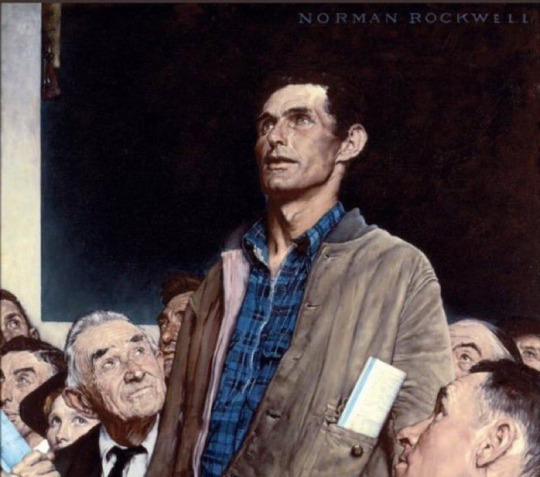
#and I'm tired of pretending otherwise lmao#off the heels of the last reblog bc it crops up in multiple games and multiple fandoms#people act like a character disliking the main character is somehow an offending the player#when it's literally just. conflict. which is a good thing in a story#“Oh I can't stand Revali bc he hates Link and he's rude and arrogant” you mean bc he has agency and character flaws??#baffling take imo that I feel like I saw EVERYWHERE when the game first came out#to be clear I also love the other three champions and link and zelda#(the shiny relic isn't WRONG about Link)#but if Revali wasn't the way he is BotW would not be as engaging imo#marie speaks
6 notes
·
View notes
Text
and the thing is i've said so many wildly conflicting things about how flawed solas' character portrayal was in veilguard but like. i unironically do believe they're All True and like i think i can kind of(?) articulate why
like solas in veilguard to me was a pretty perfect example on how clear it is that dragon age has suddenly and drastically regressed from being an exploration into moral ambiguity and that fine smudged line between "hero" and "villain" to a sudden inexplicable refusal to allow any sort of grey area in character motivations in favor of forcing them into a binary box like its a dnd alignment. and i think this specifically because there is literally No Way to write solas in a morally uncomplicated manner while still maintaining anything that makes him an interesting character.
people who hate solas hate veilguard because it removed literally any nuance to his character and repeatedly paints him as a poor mistreated victim whose only crime is that he was Forced to do things He Didnt Want to by a significantly underwritten and highly anticipated female character, and his regrets are all varying degrees of "it's my fault because i was right and they didn't listen to me :(" and no actual agency in his own decision making. his romance with a lavellan is literally front and center in the game and the only one that even gets more than a passing letter or (in dorian's case) like. two full lines of dialogue. the narrative does everything to silently paint him as the misunderstood tragic hero that no one truly appreciates and even rewrites the inquisitor so they always want to redeem him regardless of their previous disposition
people who love solas hate veilguard because it somehow managed to simultaneously do the same thing in reverse. solas has no genuine regrets or sense of guilt or actual reflection about his past behavior in the entire game. he kills his best friend and the game makes sure to zoom in on his face as varric is falling down just so you can see the sneer of contempt. the war table finebros react segments where its literally just the writers unapologetically utilizing the companions as mouthpieces for their personal opinions makes sure to tell the player that solas is unforgivable and a hypocrite and a coward for his actions. they even like. rewrote an entire part of his character specifically to remove that layer of complexity and dumb it down to the Lying Liar Who Lies. where the narrative silently wants you to sympathize with him, the characters LOUDLY want you to condemn him. your most sympathetic dialogue choices are lukewarm "well... i GUESS i understand why..." delivered in a consistent tone of disapproving resignment.
people who are neutral to solas? you're not ALLOWED to be. here you go. Dragon Age: Solas. everything is about solas. you have to make all your choices based around solas. we've written an entire game to revolve around solas. we rewrote like 4 characters to make sure that you are forced into one of the two extremes.
and it's all because you have a game that physically cannot help itself but to make you make the Good Decision and so they can't decide which decision is good and which is bad so they wrote two completely conflicting stories about him at the same time. he is the best boy. he is the worst. it genuinely feels like the writing team was actively wrestling with each other behind the scenes over whether or not solas is a Bad Guy and thus their only means of compromise was writing him as though he was dr jekyll and mr hyde without any transition or consistency. he is a villain. he is a hero. you are a bad person for not seeing his point of view. you are a good person for peacefully redeeming him. and i know there's people who think this is some sort of ingenius character study but none of this is intentional. he isn't like loghain who commits bad acts in service to a greater good. he's the prideful god who lied to the inquisitor about wanting to free the elves and instead his goal has been about his own personal ego all along. he isn't like flemeth, who does good by people and manipulates the story in your favor all for the sake of her own mysterious ends. he isn't even like the architect who lies and murders and manipulates the warden all in the service of his own deluded vision. he's the guy who wants to destroy the world because his abusive ex is forcing him to. but also he's the guy who wants to destroy the world because he thinks mortal life is insignificant and he should be in control because hes The Best.
all complexity of what was previously a deeply nuanced character has been removed, and it's because he used to be so complex that it's so disjointed and bad because they refuse to actually commit to any one direction because in that case they'd might as well make another character. but they can't. they have to make it solas. because solas is their cash cow and their baby.
they want to make a perfect solavellan happy ending because they want to please the people who love their baby but they're so fundamentally divorced from what their audience wants for solas that they ended up writing a caricaturized ai-generated romance novel for teenagers.
they want to make a cathartic fight scene where you beat the bad man because they want to please the people that hate their villain but they have such blatant contempt for criticism of their precious little baby that they make sure to infantilize and misrepresent his flaws as much as they can so he can be the sad little elf boy that you need to hug.
and despite all of this they ALSO wanted so desperately to avoid making you sympathize too much with the antagonist they were building up to that they had to make sure he acted in the most unforgivably evil ways that they could think of just so players knew this is the Bad Guy and you're the Good Guy and don't you forget it.
it's just constant self contradictory writing. it is so blatant that it's genuinely hard for me to even see veilguard's solas as being the same character. i find myself nodding my head in agreement to his most ardent haters because yeah you're right. they did spend an insane amount of time forcing you to see just how innocent and well-intentioned and pure this egotistical mass-murderer was. and i also find myself nodding in agreement with his biggest fans because yeah. you're right. they did randomly turn this character into a moustache-twirling villain who does everything short of tying rook to railroad tracks and cackling as he runs away to tear down the veil. and all this because they couldn't stand to not have him be in the game in the biggest and most impactful way. they literally could not have a story without solas.
#i hope this makes sense . i have been musing this for awhile#because idk im someone who liked solas a lot in inquisition but specifically because i liked the push and pull dynamic of his worldview#being challenged by the inquisitor's#i liked that he comes out with an understanding that ultimately. these ARE people. and they do deserve better.#and with this knowledge. he chooses to let them all die anyway.#i liked that.#datv critical#ok back to origins
293 notes
·
View notes
Note
Since I asked you about Sephiroth, I also wanted to ask about what you think of Aerith’s character and her characterization throughout the franchise.
Hhh oh god. Yeah.
So, again, Aerith begins in Final Fantasy VII as a seemingly intentional semi-subversion of the Princess Holy Maiden White Mage JRPG trope.
Mechanically she is absolutely a classic white mage, but she's also a street kid with way more life experience than Cloud, who both connects instantly with him due to his similarities with Zack, her dead ex (because, of course, Cloud is directly copying Zack's entire personality), but she also notably pushes back against him, and repeatedly refuses to let him treat her like a damsel in distress, and takes direct agency over where the story is going and what's going to happen.
As she becomes more and more conscious of her Magic Special Lineage, she changes, of course, and... arguably falls a bit more into a straight rendition of the Holy Maiden trope. Albeit I have always quite loved the reveal that Aerith isn't killed by Sephiroth just as a big tragic fridging to advance the story through Cloud's pain, but as an intentional gambit on her part to ultimately defeat the villain. The translation of the game is famously a bit wonky, but my reading of the story is that she
realizes that Sephiroth is manipulating Cloud as his primary agent in the world and that she needs to get away from him
realizes that in order to cast Holy and defeat Meteor she needs to enter the Lifestream, so
she manipulates Jenova/Sephiroth into killing her in the one place on the Planet that has the strongest connection with the Ancients so she can take advantage of their knowledge to figure out how to make Holy work.
It also kinda seems to me like she realizes that Cloud is the best chance the planet has of a champion who can defeat Sephiroth and unblock the Lifestream for the Holy spell, and maybe she sacrifices herself in part in the hopes of breaking Cloud out of Sephiroth's influence. which, yeah, that is definitely some fridging-trope nonsense.
The original game absolutely isn't perfect on how it handles it, but Aerith is (especially for the late 90s) a remarkably active player in the story, with a lot of agency entirely separate from the male protagonist, who comes into a role that requires her to separate herself from the main party and go off to set her own plans into motion.
I am overall less fond of how she got portrayed in media after the original FF7, where she really did seem to get boxed into an entirely unironic Holy Maiden trope - especially by Advent Children which casts her as a literal lover/mother to Cloud, whose especially pure and holy influence heals the blight of Geostigma once her darling Cloud overcomes his personal conflict. And certainly, a lot of portrayals of Aerith I've seen tend to focus way more on her mystical, divine Cetra Chosen One-ness than on her actual upbringing as a scrappy sassy street kid.
The Remake games... have generally walked the line okay, I think? Aerith with the steel chair might genuinely be my favourite gif from any videogame ever,

(she's just so happy to be beating the shit out of this man)
although I do feel like her portrayal in those games make her a bit too much of a Love Interest To The Protagonist character. I feel the balance in the original focused a lot more on her coming into an understanding of her role in the story separate from her attachment to Cloud, but I also have massive nostalgia glasses on my face about Final Fantasy VII, so I recognize that I am biased here.
I'm curious how the Remake trilogy, which is a wild metacommentary on the legacy of its own original, will ultimately handle her, and I really do hope it doesn't confuse the idea of a "good ending" for Aerith with the idea of being romantically paired up to a male character, or with the idea of literal or metaphorical motherhood or some other bioessentialist nonsense.
176 notes
·
View notes
Note
yippee! apologies if my takes are horrendously bad
my personal take on the matter is that i definitely think the dark worlds can work as a metaphor for escapism without undermining the darkners' personhood. it can be more than one thing, yknow? the darkners are important, their lives matter. and the lightners do go to the dark world as an escape from the problems they face in their own life. but that's not the darkners' whole PURPOSE, yknow? i mean. according to the laws of the universe of deltarune yes darkners' "purpose" is to serve the lightners but like it's not their whole purpose in the STORY.
it's sort of like how, in UNDERTALE, LOVE represents how distant you've become, how easy it is for you to hurt people. but it also literally gives you the power to destroy the world.
i think the biggest reason i believe escapism is at least a part of deltarune's narrative is queen.
queen's whole speech in both of her fights is about how she intends to provide escapism for the lightners (so that they will worship her but also so that they will he happy). she wants to turn the whole world into a dark world, so that everyone can live in bliss and not have to worry about the woes of the light world. she mentions "Staring, Tapping, To Receive Joy. Staring, Tapping, To Avoid Pain." which is like pretty much the definition of escapism
she wants to help Noelle with the problems she faces in the light world ("Noelle. Who Will Be There To Help Her? Her Strange And Sad Searches" and "My One Idea To Help Noelle, Failed") by just... shoving it away for a blissful fantasy world ("Wake? No, She Has Already Awakened Too Much. Let Her Close Her Eyes And Sleep Away, Into A Darker, Darker Dream.")
...i forgot the rest of what i wanted to say!
well first off, thank you for your ask! I'm going to get extremely in depth in my answer, so bear with me here. sorry it took several weeks to write this. the escapism reading of deltarune is pretty deeply entrenched in fandom, and to refute it, I felt it required a full-length essay to completely explain my viewpoint.
yes, "the lightners desire escapism" does not automatically translate to that being the darkners' actual narrative purpose. escapism can be a theme without dehumanizing those who are used in order to escape - in fact, I've read a number of stories that use someone's desire to escape to HIGHLIGHT how they're hurting others in pursuit of that. I believe that toby fox is definitely capable of telling a story about kids having a valid desire to escape, and about them grappling with having inadvertently created a world of real, living people as a result.
(I'll reiterate again that this is not the story arc that generally shows up in fanon. the common consensus is that the game will end in an omori-esque "growing out of" the dark worlds. it's why I have a huge dislike of the fanon escapism reading, given that the darkners are shown as people whose lack of agency parallels kris' own. it would feel cheap if the resolution to that plot was that the darkners were actually never meant to be agents in their own fates. but this is a digression.)
the reason why i DON'T believe that this is a story that toby fox is telling is because of the way the world, themes, and characters are written. put simply, it just doesn't come across as congruent with the story being told.
deltarune's main themes are agency, fate, identity, and control. this is a conflict that shows up in nearly every major character, is baked into the worldbuilding, and is the central struggle involving us, the player. the protagonist of deltarune is literally possessed by us against their will. the darkners are objects that have no choice but to serve and be discarded. over and over again, there is emphasis on roles that characters play - and crucially, roles that are imposed on them.
what would escapism mean, in this thematic context? in real life, escapism can represent any number of things, but in a story, a major narrative theme generally has to dovetail with other major narrative themes in the work. I would argue that escapism in deltarune would likely mean going to a place where characters are able to choose for themselves what roles they embody, or even to discard the notion of roles altogether. a fantasy of control is the only way to escape a reality where you have no agency. and honestly, it's hard to imagine that something could count as an escapist fantasy if you don't even get to choose whether or not you participate in it.
let's talk about kris.
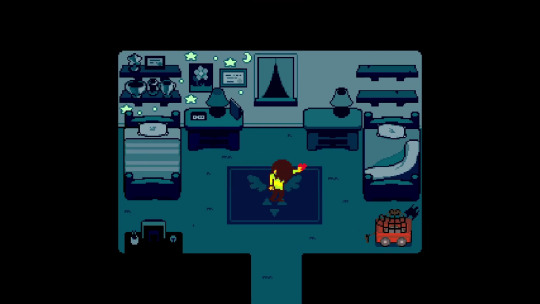
I see a lot of discussions around kris that say that kris goes into the dark worlds to escape. the dark worlds are posited as kris' fantasy of heroism. it's a world where they can seem heroic and cool, a world where they can have friends. this theory makes a decent amount of sense on the surface level, but only until you consider that kris is being controlled in order to go into the dark worlds. and it is not a control that they appear to welcome.
if those worlds represent kris' fantasy, then why don't they get to choose what happens in those fantasies? why are they being controlled by an external force, one that they actively push back against? if it's really an escape, then why does everything about this world reflect their lack of agency? if they really think this world is just a pure fantasy, then why do they care if spamton falls when his strings are cut?
because they're being deliberately obscured to the player, it is hard to say how kris actually feels about many subjects... but I do seriously doubt that they view the dark worlds as an escape. they don't act in a way that is consistent with that. they resist their lack of agency, and what little we do see of their reactions to darkner characters doesn't suggest that they view those characters as part of a disposable fantasy, either. they seem to have complicated feelings on ralsei. and of course, one of their biggest emotional reactions in the game is to the spamton fight. I would argue that that suggests they have empathy for spamton, which is a hard emotional reaction to have if you believe he's just part of a fantasy. not impossible, mind you, but it seems unlikely that kris believes that all this is simply fantasy.
also, considering that snowgrave both actively discredits the idea that the dark worlds are mere fantasy and is actively traumatic for kris... I seriously doubt they'd open another dark world in chapter 3 on a snowgrave run if their motive was purely to escape. on that route, they've seen the damage we can cause in a dark world. they know that berdly has sustained lasting damage due to our actions, assuming he's not outright dead. why would they want to try and "escape" to a place like that again now that they know what can happen?
the only answer is that they have a motive that isn't escapist.
now, as for ralsei... what part does he have to play in all this?

ralsei does play a lot to the fun, fantastical elements of the dark worlds. he delivers the prophecy that kickstarts the adventure. he flatters both kris and susie endlessly when they act appropriately heroic. he welcomes them into the castle and even makes nice rooms for them. he initially seems tailor-made to enable a fantastical experience where no real issues can ever complicate anything, and where the pain of reality can successfully be hidden from. but there's a lot of complications to the idea that he might represent an escapist fantasy.
the first, and what honestly seems the most important to me, is that he doesn't encourage kris and susie to remain in the dark worlds. he is welcoming and kind, but once the adventure is over, he prompts them to return to the light world. he wants them to deal with their more "real" problems like homework. that doesn't feel like he is trying to facilitate escapism in them. a real fantasy would encourage you to stay in it, wouldn't it?
and while ralsei is definitely invested in making sure the lightners are happy, there are always cracks that show. he isn't able to make kris ignore what happened in the spamton fight. he isn't able to convince susie to be peaceful and kind. and in his very essence, he represents a number of uncomfortable ideas. very importantly, he represents a number of uncomfortable ideas to kris.
this probably ain't your first fandom rodeo, so I'm not going to explain all the different ways that ralsei interacts with kris' personal issues. there's plenty of posts on it out there. what i will point out is, once again, it feels odd that a character who seems tailor made to bring up kris' most uncomfortable associations with their lack of agency and their outsider status in their own family would be part of a fantasy of escapism to them. you'd think that they'd prefer something that didn't have an inbuilt hierarchy, a prophecy that denied them autonomy, or especially a person that reminded them how little they fit into hometown.
that doesn't mean kris doesn't care about him at all - it seems very likely that they do. what I mean to say here is that he just seems ill-suited to an escapism reading, both behaviorally and on a conceptual level. it doesn't seem like that's at all part of his servitude towards the lightners.
of course, there is another non-lightner entity that ralsei seems diegetically engineered to serve. but I'll discuss that later.
now as for susie...
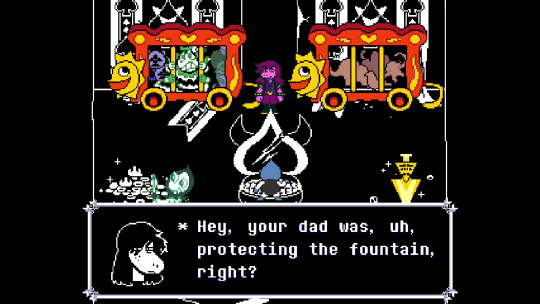
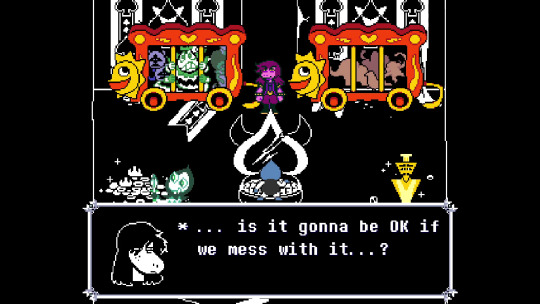
yes, susie definitely views the dark worlds as more fun than the light world. and why wouldn't she? the light world sucks for her, and she doesn't seem very aware of the fact that the dark world can also suck. you could definitely make the argument that she views the dark worlds as a fantastical escape from reality... were it not for the fact that she treats her darkner friends with just as much importance as she does kris and noelle.
can someone treat components of an escapist fantasy as real and important? of course. but given deltarune's themes of agency and control, as well as the fact that darkners exist in servitude to the lightners, I feel like you'd have to make escapism tie into forcing others into a lack of agency if you wanted the theme to feel coherent with the rest of the work. this would require susie to be limiting the agency of the darkners around her. and obviously, she doesn't do that. her presence around them might be inherently limiting, just by simple virtue of being a lightner, but she isn't aware of it, and clearly is uncomfortable with the idea of limiting anyone's agency. she encourages ralsei to make choices. and she supports lancer in basically anything he wants to do. her treatment of lancer is integral to chapter 1's narrative, and it seems like that treatment of ralsei is integral to the ongoing narrative as well!
her preference for the dark world feels very rooted in her engagement with it as its own reality. rather than trying to avoid her real-life problems by engaging in a pretense, she seems to simply want to spend time with her friends in a place that isn't cruel to her. she isn't ignoring any of the dark world's problems in service of that, either. she notices when things don't line up. if she thought of it as a fantasy, wouldn't she be inclined to ignore issues that impede the fantasy?
and critically - like kris, she does not intentionally choose her imposed role in the prophecy at first. she steps into the role of bad guy to resist it, but that role is limiting too, and she eventually acquiesces to being a hero. it's never something she's completely on board with, though. she actively pushes back the limitations that the role places on her. I find this important to reiterate when we are discussing the notion of the characters viewing the dark worlds as fantasy.
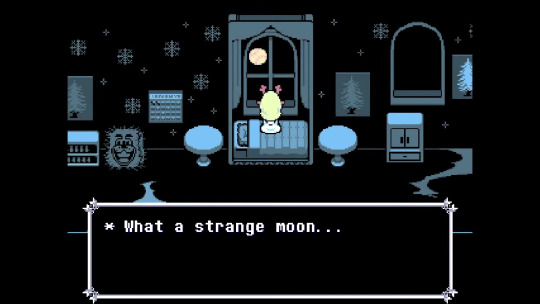
noelle has a complicated relationship to the dark worlds. susie tells her that it's a dream to make her accept the strange reality she finds herself in, which works well on her. she continues to think of it as a strange dream throughout the chapter. (though, like the others, it is not a 'dream' she entered of her own volition!)
it is also a markedly unpleasant 'dream' at times. she has her agency restricted, is kidnapped, has to evade a controlling monarch, and is even tied up in a weird evangelion cross thing on the hand of a giant robot. it's not purely fun. noelle does like scary things, and while it might be healthy for her to have an experience where she stands up to a controlling adult figure... again, the circumstances make it difficult for me to assume that this is a fantasy she would choose for herself. not impossible, mind you, but it's not the first reading of the situation that comes to mind.
and while she does say she wishes she could dream like this every day in the normal route, that does happen specifically because she was talking to the girl she likes. it makes sense she'd find that pleasant. I don't think that necessarily equates to her finding the dark worlds escapist.
and importantly, this isn't the sentiment that she expresses in every route.
again, there's a lot of analysis on snowgrave, so I won't bother regurgitating it much here. but it's nightmarish for both kris and noelle, and very likely fatal for berdly. noelle needs to believe that the event is a dream, for her own psychological safety, but one of the most important parts of snowgrave...

...is that its events, and the world it took place in, are very, very real.
noelle wants to have the strength to face her problems, both in the regular route and in the snowgrave route. rather than escaping from them, she views the "dream" as a chance to practice dealing with her day-to-day issues. it's just that in the regular route she finds that strength authentically, and in the snowgrave route, that desire is manipulated and pushed until she is forced to kill berdly. she doesn't interpret snowgrave as an escape gone wrong. she views it as a dream that became a nightmare. and those are two extremely different things.
but i haven't even gotten to the biggest thing that undermines the concept that the dark worlds are a metaphor for escapism! which is: this fucking guy is dead wrong about everything.
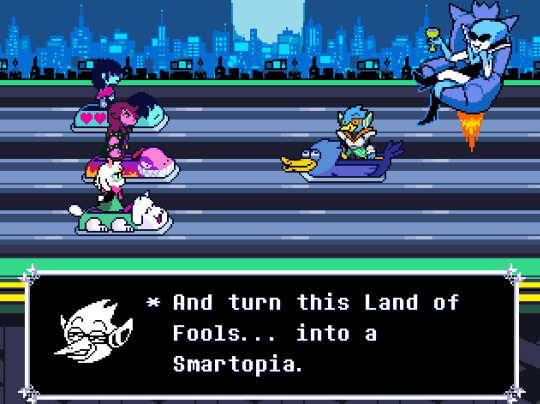
so full disclaimer - I really love berdly. I think he's slept on a lot in the fandom because he's annoying and weird. which is fair, I suppose, but I think ignoring him hinders a lot of people's understanding of deltarune's overall narrative. because berdly often illustrates a lot of concepts in the game, but his narrative framing as a joke (usually...) prevents the player from taking it completely seriously. he has things to say and ideas to show off, it's just that he's often very loud and kind of dumb in his expression of them. which is kind of the point!
ralsei brings up the idea that the darkners are meant to serve the lightners very seriously in chapter one. by extension, and by way of the literal mechanics involved in a dark world's creation, we can infer that this logic is probably something that also applies to the dark worlds themselves. they are allegedly worlds and characters that only are supposed to fulfill a dream of the lightners. but due to narrative framing and deltarune's themes, we know that that's not the full truth. however dark worlds and darkners are created, they deserve to have their own agency. they can't just exist to fulfill a higher being's wishes.
you know who else undermines that view of the dark worlds? berdly! berdly does!!!!
because berdly is the only lightner in the game so far who does take the dark worlds to be an escapist adventure! he wants to turn cyber world into smartopia. he views this as a chance to be a cool hero. he believes he's going to get the girl, he's going to shape this world to his own liking, and maybe also he's going to get queen to acknowledge him or something so he stops being a forgettable little bluebird. and not only does none of this happen, his steadfast belief that it will happen is continually a joke within the narrative!!
berdly's wishes for uncomplicated escapist fantasy are flat-out denied by the dark worlds themselves. as a lightner, those worlds should be serving him. he should have the power to do whatever he wants within the bounds of an escapist fantasy. these npcs should be singing his praises!
but he doesn't have the power. and this world doesn't sing his praise. because it just isn't an escapist fantasy. he isn't right to view it that way. his wishes for heroism are always going to be thwarted.
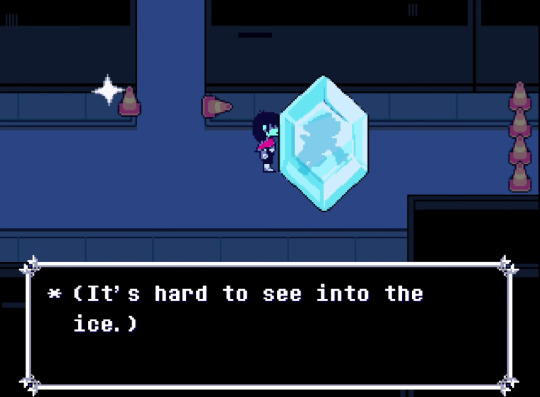
so now that I've gotten all that out of the way, let's swing back over to the subject of your original ask. queen.
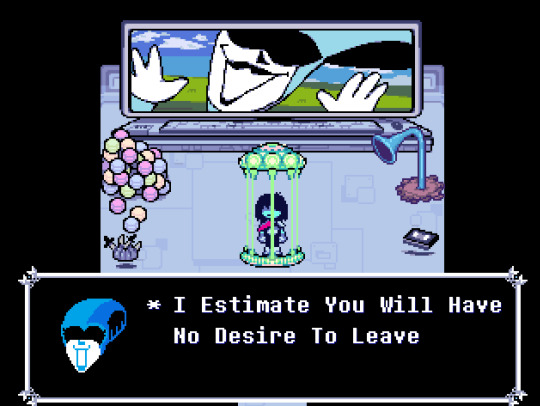
because, like berdly, queen's entire character arc is about how she's completely wrong about what the lightners actually want.
queen would in fact like nothing more to place the lightners into an escapist fantasy. she believes that that's the best way to serve them and make them happy forever. as a darkner, queen has very much internalized the idea that a lack of control is what actually makes people happy. since darkners have no choice in their destinies and are supposed to be happy in it, and since she personally finds her role as a darkner fulfilling, she believes that that's true of all people everywhere. if you want to make people happy, you just have to remove that pesky personal agency!
so she spends the story trying to force the lightners and particularly noelle into situations where she controls them in order to make them ostensibly happier. she does genuinely believe that this is the right thing to do, but as she finds out eventually, she's just wrong. noelle doesn't want that. queen believes that escapism is why the lightners use the internet... but that's totally wrong too.

while there are other searches mixed in, noelle is trying to use the internet to find her sister. instead of trying to hide from whatever happened, noelle wants to figure it out. queen's thesis about noelle and the lightners is proven wrong even before she personally encounters noelle in the dark world. it's just that queen doesn't realize it due to her limited perspective.
the concept of escapism being brought up with both queen and berdly is not there to say that the dark world is escapist. rather, it's there to say that it isn't. despite the dark worlds being a fantastical place, they are extremely real. to view them as a means of escape is foolhardy at best. you cannot act as though you are above consequences within them.
themes and ideas exist within the story for a sake of an audience. so let's get into the final character I need to discuss here. hopefully this will tie my thesis of deltarune together neatly.

that character is of course us. the player.
when creating a piece of fiction, an astute author will often identify and anticipate an audience's reactions to certain things in their work, and write things in such a way that they elicit the desired reactions. in essence, a writer is directing the "character" of the audience. how we feel and how we are anticipated to react to things is an integral part of nearly every fiction.
that effect is far more overt when dealing with metanarrative fiction that diegetically involves the audience. since the fiction is saying a lot of things about the general 'you,' the audience in aggregate, your reactions to certain things in the story have to be finely cued and anticipated by the author, so that the author can thus commentate on the reactions that you have to the story. the "character" you are assumed to inhabit is posited by the author to have certain traits.
to explain what I mean in plainer terms, I'll use the player of undertale's no mercy route as an example. because undertale is commenting on the way rpgs generally work. the player's behaviors in no mercy are attributed by characters in the story to be the result of us acting like a typical gamer. we kill the characters in the game because we want exp. and more than that, it's because we want to see everything the game has to offer. the role we inhabit in this role-playing game is that of a completionist. you could say that that's assumed to be our "character" in no mercy.
deltarune also posits that certain things are true of its audience. by being written to evoke certain cultural ideas, rpg tropes, and references to undertale, it guarantees that its audience will probably have certain traits, and spends a large amount of its conceptual focus commenting on those traits. one of those traits is nostalgia, which is probably an idea that I'll expound upon in a further essay because it's quite integral to my reading of deltarune. but the main one I mean to discuss here, and why I went off on this tangent about how audiences are dealt with in metafiction, is that we are posited as someone who believes in the logic of certain narratives.
deltarune's writing evokes a lot of portal fantasy narratives. alice in wonderland, narnia, pretty much every story where it's revealed at the end to be all a dream... the story of deltarune superficially resembles a lot of those. this, I think, is responsible for the popularity of the escapism theory. because those stories are often at their end about a child learning to put away fantasy and grow up, people tend to believe that deltarune must be about the same thing. but I truly don't think that deltarune is trying to do anything with that aspect of portal fantasy narratives, at least not directly. its main characters aren't involved in that exact type of coming-of-age arc.
instead, deltarune is very concerned with what happens to characters in fantasy, and specifically fantasy rpgs. if your world is deemed to not matter because it's a dream, what does that mean for you, who has no choice but to live in it? if you are an npc whose role has been predetermined for you via script, then can you ever decide for yourself what you want? what if you want to matter? what if you want to be your own person?
as the major controlling force of deltarune, we are initially cued to believe that deltarune is like a dream. it superficially fulfills so much of what we want from undertale fanon. hometown seems like it's a perfect idyllic town, at least until you start noticing the obvious cracks. and remember what I said about ralsei earlier? he is so reminiscent of asriel, and extremely eager to help us. it's not a stretch to say that making us specifically view deltarune as dreamlike and idyllic is probably part of his purpose in the game.
I would not say that we are posited as escapist. but the idea of escapism as brought up with queen and berdly is meant to strike at the heart of a much deeper idea that deltarune is trying to deconstruct. because if we view deltarune as a dream, escapist or otherwise, then we are inclined to write the internal realities of the characters inside off. the dark world can disappear without it mattering. we can control kris without it mattering. if it's all a dream, what does it matter? why should we care to let its characters go free? aren't we supposed to be in control?
if deltarune is an rpg... what is the significance of us interacting with it?

#deltarune#deltarune analysis#BIG big thanks to tvlandofficiall for being my sounding board and providing the flavor images for this essay#this one gets into some big overarching analysis of deltarunes construction and what it deconstructs. hope u enjoy
420 notes
·
View notes
Text
Previously, I posted about how Lin Ling replacing Nice is reminiscent of those transmigration stories, and today I just had a thought: What if To Be Hero X is actually a transmigration story??? The world of the superheroes is the world of a novel (or a comic book, show, game, etc.), and one soul from the real world transmigrates into this world and vows to change the ending.
This is mostly just gut feeling for now, but a lot of the mysteries and quirks of this show would make sense if this were true.
Like, why have multiple animation styles? It can’t be just to flex the budget and the skills. If this were a transmigration story, then the varying styles could be visual cues of how far or near the “current story” is to the “original story” and maybe even to the “real world.” Or, to put it simply, it’s to show us different layers of what is considered the reality within the show. This would also complement the several glitching animation we see (like in the OP), which could be indicative of something in the current story overwriting the original story.
Next, why is X always breaking the fourth wall (i.e. looking at the viewer)? Could he be the transmigrator trying to change the plot development of the “original story”? And that’s why he’s always looking at us. Because he’s from the “real world.”
Now, if TBHX really were a transmigration story.... Then, who was the protagonist in the original story?
First off, I don’t think it’s X. Salaryman!X gives too much background character vibes. The fact that he’s also not under any company and seems to have just come out of nowhere really smells a lot like those plots where the transmigrator found themselves in the body of an NPC or extra, but having read the original story to the end, is able to dominate the story world and make a name for themselves. So no, I don’t think it’s X.
I think....I think the protagonist was og!Nice. He’s literally the “perfect hero” in a superhero world; the Gary Stu of the fictional world.
But then he died. And literally overwritten by Lin Ling.
God, I know this sounds crazy, and I can’t provide much evidence right now coz we’re only two episodes in...
But if TBHX really were a transmigration story.... that would be fucking wild.
Edit: Just remembered that TBHX literally exists as show posters on Link Click. (Link Click being the “real world”? Lol) Yeah, yeah, it was just a Bilibili easter egg, but still fun
Edit2: SHIT SHIT SHIT THE ED RHETORIC!!!
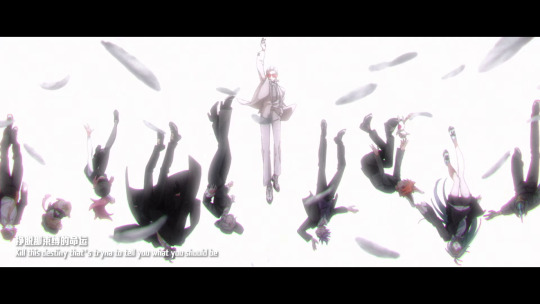
Kill this destiny that’s tryna tell you what you should be
THAT IS CLASSIC TRANSMIGRATOR RHETORIC!!!!
Very so often, in the beginning, a transmigrator would just go along with the plot of the “story” or the rules set out by the System (if you don’t know what that is, uuhh think of it as a literal game/computer system that gives the player/transmigrator instructions on what to do). To the transmigrator, every other person in the story world is just a fictional character with no agency. So it is a very classic and crucial narrative point in the genre that the transmigrator realizes that all the other people in the story world are no longer just fictional characters. And once they realize that, they will then start deviating from the plot, no longer bound by any internal or external rules. They may also try to change the story endings of the other “characters,” literally killing their destiny that dictates how their life should be written.
(Of course, the quote above could just be alluding the the fucked-up Trust System in TBHX, but!!! These are not in conflict okay!)
#transmigration#<- it’s a cnovel genre btw if you don’t know. just look it up#tbhx transmigration theory#tbhx meta#to be hero x#tu bian yingxiong x#凸变英雄X#tbhx#miyamiwu.meta#miyamiwu.src
74 notes
·
View notes
Text
In less than a month, Donald Trump has come through on his promise to exact retribution on his enemies and to set about overhauling the federal government. Whole agencies are potentially being tossed, to use Elon Musk’s heedless language, into “the wood chipper.” To understate matters radically, Trump has sparked many debates. One of them is how close is the United States to a constitutional crisis: Are we headed toward one, on the brink, or already there?
If there is going to be a concerted resistance to Trump’s blizzard of executive actions, it will likely play out largely in courts across the country and, ultimately, in the Supreme Court. And if the Administration spurns court orders, what happens next will conceivably determine the fate of democracy and the rule of law in our time. Chief Justice John Roberts himself said in December, as the Biden Administration began closing shop and the incoming Trump Administration made its intentions increasingly clear, that in our current politics, we now live with the “specter of open disregard for federal court rulings.” And what would such a conflict look like with MAGA loyalists like Pam Bondi leading the Justice Department, Pete Hegseth leading the Department of Defense, and Kash Patel leading the F.B.I.? Some legal scholars recommend a keep-your-powder-dry attitude for the time being. But there has arguably not been such a potentially dramatic test of the country’s constitutional order since the Civil War era.
The American Civil Liberties Union, a major player in this drama, has been quick to file lawsuits on, among other issues, birthright citizenship, which the Administration seeks to eliminate. Anthony Romero, who is fifty-nine and grew up in public housing in the Bronx and later in New Jersey, has been the executive director of the A.C.L.U. since 2001. I spoke with him recently for The New Yorker Radio Hour. His sense of resolve and confidence were all in evidence. But if things go south and Trump defies the courts, he said, “we’ve got to shut down this country.” What does that mean? Our conversation has been edited for clarity and length.
Let’s begin with the most essential question, legal and political. Are we—less than a month into the Trump Administration—on the brink of a constitutional crisis?
I think we could very well be there. We’re at the Rubicon. Whether we’ve crossed it is yet to be determined.
Well, describe what the Rubicon is.
The Rubicon is the flagrant disabuse of judicial power. If the Trump Administration decides to run the gauntlet and openly defy a judicial order, in a way that is not about an appeal, it’s not about clarifying, it’s not about getting a congressional fix, but open defiance to a judicial order, then I think we’re there.
What are the issues where that’s a possibility?
Well, there are forty cases, so many of the issues could be the one that precipitates the Rubicon moment. There have been a bunch of lawsuits around the Department of Government Efficiency, and whether or not the DOGE and Elon Musk have overextended their power. There are some who say that they’re violating the Privacy Act; that they’re accessing personal identifiable information on American citizens—their Social Security numbers, their tax returns, all sorts of information that are in the government data banks. Now, whether or not they’ve actually accessed that, whether there’s harm, whether or not the individuals who are bringing cases have standing, those things are all to be determined by the judges.
Then there’s all the questions around shutting down, or the closure of grants from the federal government, from U.S.A.I.D. and other agencies. And there’s the “fork in the road” litigation.
And just to be clear, this is considered illegal by legal experts because—
Because Congress appropriates the money. It’s not in the President’s power to rewrite the appropriations from Congress.
You have the Vice-President of the United States saying that judges are not allowed to control the executive’s legitimate power. What say you, as the head of the A.C.L.U.?
“Legitimate”—that’s the word that jumped out at me. And that’s what we’re arguing about, whether it’s a legitimate use of executive-branch power. It’s not a new controversy. We’ve had these debates before. The unitary executive—remember that back in the days of George [W.] Bush? Of course, most Presidents have tried to exert a much more muscular approach to executive power than I think the courts or Congress often give them the room for.
Where do you think the Rubicon will be—on what issue and in what court?
The one I’m most worried about is birthright citizenship. That was the first executive order. That was the first case we filed, two hours after he signed it.
What does the Trump Administration want and what does the A.C.L.U. want?
They want to eliminate the right to citizenship if you are born here, which was established in the Fourteenth Amendment. It’s also in the statute. It’s how we created American citizens out of the children of slaves.
For us in the civil-rights community, this is hallowed ground. This is how we fixed that problem that we had in terms of chattel slavery, and how we made all of us citizens and so that the citizens included the children of slaves. It’s also the way that we became a nation of immigrants and levelled the playing field. It’s the great equalizer, David.
And so to go at it and say, in an executive order, I’m going to repeal birthright citizenship is both trying to undo a core tenet of the Bill of Rights and also the statutory provisions, which are equally clear. So we have belt and suspenders on when it comes to birthright citizenship, and they’re trying to rip them both off.
If birthright citizenship goes the direction that the Trump Administration wants it to, what are the repercussions and what are the actions that could follow?
Well, the repercussions are enormous. If they were allowed to repeal birthright citizenship, that means that even people who are here lawfully, and whose kid is born here, would not be a U.S. citizen. So take, for instance, two graduate students at Princeton who are here lawfully, and are endeavoring to make a life here. If their kid is born here, it wouldn’t necessarily mean that that child is entitled to birthright citizenship. So the implications are enormous.
Do we have any sense of the number of people that would be in jeopardy?
There would be hundreds of thousands. We have clients already in our litigation who are pregnant women, whose children would be born after the date of the executive order, whose citizenship would be called into question.
So siblings would be potentially rent apart, and parents and children would be rent apart as well.
And you would create a legal vehicle for intergenerational stigma and discrimination. In places like Germany or Japan, these countries still struggle with what it means to be a German citizen or Japanese citizen. You see the discrimination against Koreans in Japan. That’s because they haven’t had a concept like birthright citizenship, the way we do.
Who else has filed birthright-citizenship cases?
We have the attorneys general, we have many of them on the East Coast. I think there are two cases on the East Coast, one case on the West Coast. And the attorneys general are important contributions because they’re making arguments on behalf of their citizens not just because it implicates the citizens of their state—of New York State or New Jersey or Washington State. They’re making administrative arguments. How the hell are we supposed to implement this?
I looked at my birth certificate, and it basically said: Anthony D. Romero, son of Demetrio and Coralie Romero, born in New York City. There’s no vehicle for these states to corroborate the citizenship of the parents. How are they going to do the administrative investigations on whether or not you’re a citizen? It creates an enormous burden on the states to be able to do that. And so I think that’s why the attorneys general are so key in this litigation as well.
If you lose?
We ain’t going to lose.
O.K. But if you lose, that case would then be sent to the Supreme Court?
It would go up into the Federal Court of Appeals and then to the Supreme Court.
And knowing what you know about the Supreme Court, ideologically, politically—
I think we win.
You win anyway?
We win anyway.
Because you have to say that?
No, no. I’ve never been this bold. I’ve been in my job twenty-three years. I don’t usually predict the outcome of our cases, because my heart’s been broken multiple times.
And you don’t think your heart will be broken again?
No.
Why?
Because I think this is really, really going a step too far. [Samuel] Alito and [Clarence] Thomas are the only ones I can’t bet on, but I think even [John] Roberts, [Neil] Gorsuch, [Brett] Kavanaugh, and Amy Coney Barrett, and certainly the three liberals, are there at a point where the Supreme Court would eviscerate their legitimacy among constituents and audiences that really care.
Is your confidence specific to birthright citizenship or is it across the board?
No, it’s birthright citizenship. The rest of it is more up for grabs.
Where else could you locate a constitutional crisis that’s now happening, or in the process of happening?
Suits around congressional appropriation of funds that are now being disregarded by the executive branch—those very well could be the precipitating factor for a constitutional crisis.
What happens when and if there is a constitutional crisis? What happens if a White House refuses to obey a court order?
Well, then you’ve got to sue to implement it. I mean, we’ve been here before. We’ve had two different lawsuits, years ago, against Sheriff Joe Arpaio and Kris Kobach, both of whom refused to implement an A.C.L.U. order that we had won in litigation. [Maricopa County] Sheriff Joe Arpaio was someone who was trying to round up immigrants in Arizona. He was corralling people up and having Gestapo-like law-enforcement efforts focussed on immigrants. [Kansas Attorney General] Kris Kobach was the one who was trying to purge people from the polls.
And both of these individuals we sued, and we won, and they didn’t like the fact that we won. They tried to defy these court orders in both of those instances, and so you sue to implement your rulings. You would threaten them with fines and threaten them with incarceration. Ultimately—
You’re going to do that with the President of the United States?
You bet.
We’ve seen the Republican Party become the party of Trump. They are well aware that if they defy Trump in any way, they’re going to lose their seat. Doesn’t give you a lot of confidence, does it?
Look at the Supreme Court. Six to three. It has been a generational shift in the consolidation of conservative power in the Supreme Court. If I’m a good old conservative, I’m not going to fritter away that power. Why would I immediately allow my Supreme Court or my federal judges to be diminished in their status and power?
And you will, in the process, though, defy the President who puts you on your seat?
I think there will be moments when good people of conscience will stand up. I do.
So what stands between us and the ruination of the Constitution is the conscience of good people?
The conscience of good people, the work of good people. The judges are the front line right now. It’s not people in the streets as much. It’s really the judges who are playing a critical role in this effort.
Do you sense, in the political and public world, any politicians who are forcefully, clearly, and effectively speaking up for what you are talking about?
I’m looking.
You’re looking?
I’m looking, I’m listening.
And not finding any yet?
There’s a lot of mumbling. You see the articles about how some Democrats are trying to find their feet under them.
What’s the problem?
I think they’re still a little bit in shock. I don’t have to run for office. I don’t have to be popular. When I file my transgender-rights lawsuit, I don’t need fifty-one per cent of the American people to agree with me. I know what’s right; the equal-protection arguments are what’s right.
Yeah, but let me ask you a question: If they’re not going to stand up now, when will they stand up? And for what?
It’s a great question.
Are you despairing of it?
No, I think it comes around. I compare this moment, David, to the 9/11 moment. That’s when I started my job, the week before 9/11. You remember the Patriot Act was enacted with everyone’s assent in Congress except for one, Russ Feingold.
And so I told my folks back at the A.C.L.U.: this is a time where you have to ride this moment, just like we did after 9/11. We have to build public momentum. The war on terror was very popular. The deportations that former Attorney General John Ashcroft did, the creation of Gitmo as a place to hold people and detain them . . .
Gitmo is about to get a new lease on life, potentially.
They’re going to try. We’re litigating that one, too.
We’ve already seen ICE scoop up U.S. citizens and immigrants not convicted of crimes. What’s the legal path to protect people in schools and churches and day-care centers from the threat of deportation?
Well, there are sanctuary-city laws and sanctuary-jurisdiction laws that are in fact—
Which are the source of contempt for the Republican Party.
Yeah. And they can be defended. It’s important that, for instance, the litigation they’re bringing against the City of Chicago, we think is really far afield. They cannot use the power of the purse and pulling money from roads and hospitals and schools to pressure them on immigration. That’s got to be challenged in court. The governors and the state attorneys general, especially in the blue states, have enormous power to put up roadblocks.
You find that they’re feeling their sense of authority, or are they backing off?
I think some of the governors are beginning to find their sense of authority—in Colorado and New Mexico.
How about New York?
In New York, we’re working on it.
“We’re working on it.” You’re not confident in Governor [Kathy] Hochul?
Well, I think the Governor is really working with us. I think the mayor is a bit more complicated on the immigrants’-rights issue.
Eric Adams, in New York City.
I think it’s complicated.
“Complicated” is a euphemism for what?
For not what we’d like it to be.
For not standing up. [Laughs.]
For not what we want it to be.
One of the characteristics of the moment we’re living in is the absolute speed and volume of what’s coming out of the White House—what Steve Bannon called “flood the zone with shit.” That’s the strategy and it’s being enacted with real efficiency and real skill as compared to the first term.
But the zone is responding. There are more than fifty or so executive orders that have come down. There are more than forty lawsuits that have been filed in response. I’m really quite impressed with the ecosystem of groups that have been involved. The A.C.L.U. can’t do it alone. A group like Democracy Forward is an excellent group doing outstanding work on many of the issues that we don’t cover. There are groups of attorneys general, as you mentioned, the blue-state attorneys general. It’s really quite a different moment. People realize that the zone is being flooded and it requires us to coördinate with each other in a way I haven’t seen before.
You sound pretty confident.
I’m not sure I’m confident in the ultimate outcome. I’m confident in the response that we’re engaged with. We have filed over ten lawsuits already in three weeks.
One of the major, major cultural issues that came up during the election—and this is very much in your wheelhouse—is free speech. The A.C.L.U. has fought for the free speech of leftist students on campus as well as somebody like Ann Coulter. Your traditional defense of the First Amendment is bipartisan, but when a gazillionaire like Elon Musk buys a social-media platform and brings Nazis back to it, and appears to do a very strange salute on television, how does the A.C.L.U. absorb that?
I think the same principles apply, right? It’s just that we have to make sure that the government stays out of the business of regulating people’s private speech. That is probably my biggest concern right now, that hasn’t yet materialized or matured. But it may.
Were you comfortable with the way Facebook and Twitter barred certain people from—
No. We criticized Facebook and Twitter when they de-platformed Donald Trump. I mean, they kept people like [Jair] Bolsonaro and [Viktor] Orbán on, but they de-platformed Trump. We felt that they were not calling balls and strikes as they saw them. And we criticized them in real time, and we applauded them when they re-platformed them.
So are you pleased that, say, Mark Zuckerberg has changed his policy on Facebook?
Facebook is afforded a lot of latitude because it’s a private entity—the right to set its terms of service. That’s part of the free-speech kind of framework.
And you see it as a platform or as a publisher?
I see it as a platform. And there are parts of it when they’re pushing the algorithm out, and it’s both a platform and a publisher. And that’s why I think they can have a different set of rules applying to different parts of these companies. The algorithm is more like a publisher, and so you have to scrutinize it differently. But the terms of service—in terms of the individual user, and the ability to post one’s content, even when it’s hateful or not aligned with the A.C.L.U.’s values—has also got to be secure.
Let me go back to your trust or confidence in the courts. A federal judge called out the Trump Administration for blatantly ignoring an order to resume federal funding for the Office of Management and Budget that had been frozen. What can you do if Trump simply ignores the judges, and doesn’t want to listen to anybody, and just directs his people to keep doing what they’re doing? What possible authority or power does anyone have in this, much less the A.C.L.U.?
I think you keep running the gantlet. Basically, the Trump Administration is arguing not that we don’t have to heed you. They argue in their response to the judge: no, we are heeding you, we think your order was more limited. The judge then clarified, I think on Monday, saying that no, he had meant for them to reinstate all the grants writ large. And so this will continue to move up the food chain.
The crisis moment comes when the Supreme Court rules and says, The Trump Administration has flagrantly disregarded a clear judicial order, and thou must comply. And if they don’t comply, then we’re in a different moment.
I realize I’m repeating myself, but: play that moment out.
We have to exhaust all the remedies. We have to get fines. We have to ask for incarceration of individuals who flagrantly disregard judicial orders.
And that includes?
And that includes the federal-agency heads.
And it also includes the President of the United States, does it not?
He himself or the Vice-President? Sure, sure. No one’s above the law, right? Now, if we do not succeed, let’s say no one comes—the cavalry doesn’t ride—
Then what?
Then we’ve got to take to the streets in a different way. We’ve got to shut down this country.
What does that mean?
We’re just beginning to think it through. We’re talking with colleagues and other organizations. There’s got to be a moment when people of good will will just say, This is way too far.
What’s the historical precedent for that anywhere?
Well, there have been efforts. Marbury v. Madison—the case in which the government tried to snub its nose at the role of the Supreme Court. The Supreme Court was not yet as powerful or as established an institution as today. You also had F.D.R., who tried to pack the Court. It’s not new that Presidents bristle at judicial oversight. Clinton passed some of the most egregious court-stripping measures, like the law on prison reform, where he basically tried to get the courts out of the business of looking at prisoners’-rights cases or immigrants’-rights cases.
But I can just hear the listener’s mind saying, O.K., that was Bill Clinton, and that was bad enough. This is a person, an executive, a politician of a very, very different order.
Totally agree. And we’ve got to take it one step at a time.
When you say “shut the country down” and take to the streets, who’s doing that? Because I have to tell you, this time around, so far—and we’re not even a month into this—the number of people that you sense have decided things are so complicated, difficult, or awful, and have decided to shut politics out of their mind—“I’m not watching the news,” you hear this—is alarming.
It is alarming, but it’s also true that it’s evolving. I mean, for instance, we had a town hall recently. Fifty thousand people turned up. Largest number ever, even compared to Trump One.
It’s a self-selecting group, though.
Yeah, but that still shows you that there’s more energy there. There’s more of a heartbeat. I wouldn’t give up on the patient just yet. There’s more of a pulse.
Let’s go back to the phrase “shut the country down” that you used. What does that mean?
I think you have to call on, for instance, corporate leaders. We’ll have to yank them into the pool with us if they believe that part of what is going to protect good corporate interests or the workings of the economy is the rule of law. There’s got to be a moment when people are saying, Can you countenance this?
President Biden had a number of instances when he bristled at judicial oversight and judicial review. He hated the effort to shut down his student-loan program. It’s one of his signature programs. He never got it through, because the courts got in his way.
But it’s really quite another matter when there’s a final order, from the highest court of the land, and the President just says, Doesn’t bother me. I don’t have to heed you or hear you. That is a moment when I think we’ll be able to harvest the opinions of people, and get people engaged in a very different way.
One of the instruments for mobilization is communication—information, the press. We’ve seen, in the last weeks, a lot of outlets of the press pay obeisance as well.
Sure. The settlements.
And what does that tell you?
Well, that means that we’ve had to help them find their spine.
It’s located in the back. It connects the brain to the rest of the body.
And it can be reinforced with a steel rod. With or without anesthesia. But I think it will have to come, David. And I think—
Haven’t the courts, though, changed in recent years? Donald Trump had time to install a lot of—
Twenty-eight per cent of the federal judges are Trump appointees.
And have you sensed that difference in your cases?
Sure, sure. They’re on the bench and sometimes they watch his back, and sometimes they rule in ways that are kind of head-scratching in terms of how far they will go to protect the person who put them on the bench. It’s also true that sixty-five per cent of the judges have been appointed by Obama and Biden. So there’s a larger number of them. That will change as they start to move judicial appointments.
I mean, what’s in front of us? I mean, let’s talk a little bit about what else might be in front of us that’s not just the onslaught of the executive orders. This is where I’m going to curl, or uncurl, your listeners’ hair.
We have not yet seen the mass deportations that I think are on the horizon. I think the number I’ve seen is somewhere between five and six thousand people in the first two weeks. It’s about half the number of the deportations that you saw in the last year of Biden. I don’t believe it’s just smoke and mirrors on this one. I do think they’re going to run the gantlet on deportations. When they start revving up that machinery, that’s going to be massive. So that’s No. 1. I think the deportations is something to watch out for.
Have you looked at the polls on how people favor deportations?
Yeah, but when they start seeing that their nannies or their gardeners or their fellow-workers or the local shoeshine guy—
Or their neighbors—
Or their neighbors are getting ripped up, and that U.S. citizen kids are put in family protective services as a result of it, when they start seeing . . . Because what they ran on was saying, We’re going to get rid of the criminals. Well, that’s clearly not what they’re doing already. When they really ramp up and they start grabbing all these individuals who are part of the social fabric, I think we’ll harvest that.
You’re suing the Trump Administration for an executive order forcing passports to reflect gender assigned at birth, which has laid out a binary definition of gender. What’s the point of Trump making that claim, and how do you form a legal case against it, and him?
It’s fearmongering. It’s a card that he played in the election. You saw the ads he ran. “She is for they/them, I’m for you.” It was clear fearmongering against a community, 1.5 million people, who are really under assault. You have over five hundred state laws that have been targeted at the trans community. It’s really an onslaught the likes of which we haven’t seen in generations.
On matters of speech: Would the A.C.L.U. today defend the right of American Nazis to march in Skokie, Illinois? [In 1977, the A.C.L.U. defended the National Socialist Party of America, which applied for a permit to march in Skokie, home to more than forty thousand Jews, including many survivors of the Holocaust.]
You bet. We just took the N.R.A. case a year ago. The N.R.A. came to us saying, You are the best litigation organization on free speech. And I said, O.K., I’ll take over your case. You are the client. We are the lawyers. We will argue for the N.R.A. in the Supreme Court. This was a case of Governor [Andrew] Cuomo and the administration trying to shut down the N.R.A. because they didn’t agree with its pro-gun policies. And we saw it as a free-speech issue, and we brought that case and won, 9–0, in the Supreme Court.
How does the A.C.L.U. feel about cases at, say, universities where protesters shut down a speaker?
No, the heckler’s veto is a problem. You have a right to free speech, but you don’t have a right to shut down information, debate, discussions. There are limits.
Finally, what are the main challenges now in front of the A.C.L.U.?
We are going to see a scaling up of deportation efforts. I think they will come for the millions of undocumented people in our communities. And that will rip apart the social fabric.
Congress has been on the sidelines. Congress can get into this game, to our detriment. The Republican Party controls both houses of Congress. When Congress starts rolling out its version of the avalanche of executive orders that we’ve seen—in terms of a federal abortion ban, any of the efforts to defund Planned Parenthood; there’s a whole bunch of revising of the nation’s immigration laws through statute—that could be quite a moment.
The third one would be, of course, the issues around defying a judicial order that I think we are already looking at and trying to anticipate. But when those elements come, I think that we’ll have really a very different debate in this country.
One of the seminal texts that’s been published in the past decade, warning about authoritarianism, is Timothy Snyder’s “On Tyranny.” And he warns against knuckling under in advance, and warning against exhaustion. Do you see that? Or do you see the opposite?
Knuckling under in advance? You see that in other places. I mean, look, that’s what a lot of these tech leaders, that beautiful parade of billionaires who were preening for the camera behind the President as he took the oath of office. Now, I know some of them personally, and I know that some of them were there because they felt they had to defend their corporate interests, their shareholder interests.
But I think there, you definitely see the knuckling under in the private sector. I think the fatigue factor is a matter of pacing ourselves.
Is it possible to pace yourself considering the ferocity and speed at which things are happening?
You’ve got to retain bandwidth. If we run the gantlet and we file all the cases that we need to right now, and then don’t have the ability to file them in years two, three, and four, we’ll do the country no good. We have to play this game smartly. And we are picking and choosing our battles.
112 notes
·
View notes
Text
thinking about a dazai who willingly returned to the mafia at the end of this arc without having seen the agency properly. who tells mori with a heavy smile to put him wherever, knowing that it’s too early after the conflict has ended to expect dazai not to take a shot at the mafia, therefore too early to trust him in a high position in such volatile circumstances. “put me wherever” knowing this, and knowing that his mind was still too valuable of an asset to die as he might wish. he wistfully wonders if this makes him similar to odasaku.
chuuya doesn’t need corruption for another major conflict yet, it isn’t exactly No Longer Human that is valuable for the time being, so… not like Odasaku in the sense of abilities, more like a valuable player with a low-ball position. Dazai feels oddly calm.
74 notes
·
View notes
Note
thoughts on LIS: Double Exposure?
This is probably gonna be my hottest take in awhile, but: I deeply dislike the idea of an official LiS1 direct sequel game existing. Excluding all my thoughts on the gameplay, story, Max's character, etc. I don't think a game like Double Exposure is necessary.
This isn't a new take either; back in 2020 I made a Reddit post saying I was glad we never got a continuation of Max and Chloe's story, because in order to have a plot, you have to have conflict. And to have conflict means your characters are forced to change or struggle in some way, and I simply wasn't interested in seeing that again. I never even read the comics. As long as Max and Chloe's future existed only in the fanbase's collective imagination and not in an officially licensed game, Pricefield could be as happy as I wanted and I wouldn't have to witness DN or D9's version of canon.
A lot of fans, including myself, are also confused and upset as to where Chloe could be in Double Exposure. Even if Chloe winds up having a surprise role, it would likely be too logistically difficult to write Chloe into one version of the story and not the other. Either way, DE is strongly pointing to Chloe no longer being the deuteragonist. If D9 was going to make a direct sequel with Max and Chloe, I could at least be intrigued by how they might write their dynamic and how they'd use Max's power in new and interesting ways. But instead there's... none of that. Chloe's nowhere to be seen and Max can't time travel anymore.
On a narrative level, Max and Chloe are the heart of the original Life is Strange. They represent the game's central relationship, and their very first interaction (Max saving Chloe's life) kicks off the entire story. Throughout the story, their dynamic advances the plot and mutually motivates their character arcs. You can't have LiS1 without either Max or Chloe; the story simply wouldn't exist without them. Now in DE, they don't even seem to be in each other's lives anymore. It's true, this series is meant to reflect universal feelings and experiences, which could include breakups, but the romantic catharsis of Pricefield as canon soulmates who defied time and space itself to stay together forever is something you can only get from the beauty of fiction. To jab DE's story with a dose of reality and go, "Eh, they grew apart. Shit happens," totally undermines everything the Bae ending stood for.
On a technical level, Max's rewind was an objectively brilliant game mechanic. LiS1 arrived onto the scene after Telltale had paved the way for the resurgence of choice-based, episodic games, but LiS1 totally reinvented the wheel by giving the player the option to go back and weigh each option before continuing, essentially save-scumming in-game. But the right choice was never that easy to determine, and Rewind brilliantly complemented Max's character arc of overcoming her indecision and learning to live with her choices. Not to mention, you could also use Rewind to solve puzzles, instead of the endless fetch quests the later games had. No other LiS game since then has given the player that kind of agency and interactivity. LiS2 had telekinesis, but the player couldn't use it, only Daniel. D9 tried with Backtalk and Empathy, but Max's Rewind was truly the narrative and gameplay jackpot that they haven't been able to recreate since.
So if you take away one half of the central relationship that made the first game so memorable, and the supernatural power/game mechanic that made it so fun to play... why even bring Max back at all? It just feels like D9 threw away their golden opportunity to build upon the major selling points of the first game and are only relying on name recognition of the Life is Strange "brand" and Max Caulfield.
What upsets me most of all about a direct sequel existing is that it proves that Life is Strange, as a series, now stands more for profits than originality. Life is Strange will always be an IP meant to make money for Square, I know that, but back when LiS1 was just a brand new episodic game, it stood out for how different it dared to be. In a landscape saturated with shooters, sexualized female characters, and casual misogyny, LiS1 instead featured a teenage girl in a contemporary setting that took her seriously and made her the hero of her story. Before it was a franchise, LiS wasn't concerned with the bottom dollar; it was a piece of art that just wanted to tell a thoughtful, unique story.
Whether you love it or hate it, Life is Strange 2 was an insanely risky follow-up to Life is Strange that refused to rely on the convenience of a direct sequel because Dontnod stuck to their artistic vision. Meanwhile, all of Deck Nine's games have leaned on the first game's following to generate interest (BtS being a direct prequel, TC bringing back Steph, and Wavelengths expanding on Steph's connection to Chloe, Rachel, and Arcadia Bay). In other words, all of the subsequent LiS games by D9 have played it very, very safe. It's worked like a damn charm because there are still elements I love about each game, but the basic principle is nostalgia-baiting fans. It's just that now, Double Exposure isn't hiding that nostalgia bait at all anymore and prioritizing profits over telling a unique story. It's sad to see that LiS has strayed so far from its risky, daring, original, and unique artistic beginnings.
Before I end, I'll say that I can't be too cynical about it all, nor do I want to be. Because I can't deny how much joy this whole series has brought me, too. LiS was what got me into narrative adventure games and pushed the boundaries of what a video game could be. If nothing else, I am truly thrilled that Hannah Telle got the chance to play Max again. D9's always been great at maintaining relationships with their actors, and the casts of their games always have consistently great chemistry. Getting recognized by Erika Mori on my own blog is still unbelievable and speaks to the amazing community that LiS has built. As you can see, I'm still posting and reblogging stuff about Double Exposure. And while I don't see myself buying or playing this game for myself, I know it'll keep all of us talking for awhile, and I still live for a good discussion.
Thank you for asking! And thank you for reading.
#lis2#lis#lisde#life is strange#life is strange double exposure#life is strange: double exposure#life is strange 2#life is strange before the storm#chloe price#max caulfield#rachel amber#pricefield#my post#answered asks#daraactualtrash#rad mutuals#lis: de
297 notes
·
View notes
Text
Thinking again about how Katara is portrayed in "Ember Island Players" and how a lot of her objections to the play have to do with how it portrays her as an overly emotional damsel who needs Aang to save her from her wretched existence, and the disrespect of her entire culture and people that is used to portray her as someone who needs a man to rescue her.

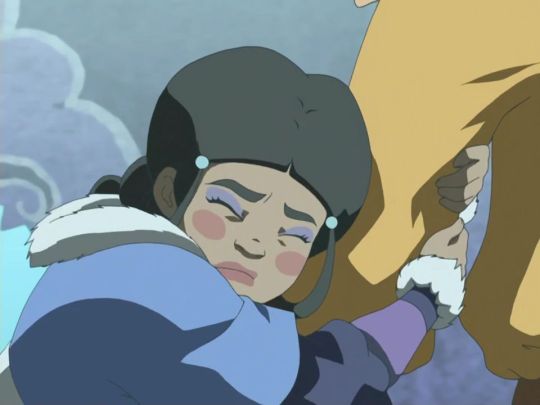
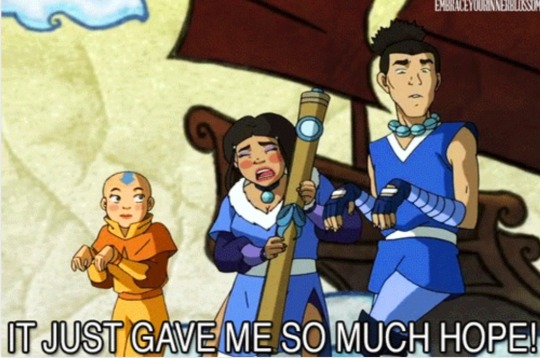
Which on one level you can interpret as Fire Nation propaganda, but it's also a meta commentary on the series itself, because Katara does rely on Aang as a savior figure and there are certain scenes that are specifically designed to damsel her so that Aang can be a hero.
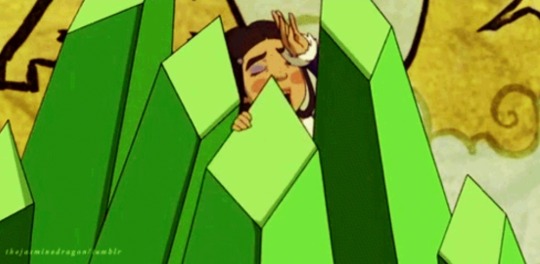

It's interesting that the show chose to portray Katara watching herself in that position and specifically show that she doesn't like it, in the same episode that they have the real Aang act like them getting together is a foregone conclusion.
In contrast, although the play changes Katara's relationship to Zuko into something romantic and lurid, they do get one thing right about it.

And that's that Katara is the one making the choices.
Of course they also ramp up the sexuality in a way that is gross, especially considering the context of this being a FN play meant to disparage the other nations, but on a meta level it's also meant to make us, the audience, feel disgusted by a woman who makes overt sexual overtures.
I've seen people (who are anti zutara) say that the play is showing Katara as the colonized woman who falls for the colonizer, but that's not what's happening here. Zuko is not portrayed as dominant by the play, and it wouldn't make sense for the FN to portray him that way, either, since one of the purposes of the play is to portray him as a weak and ridiculous traitor who is ultimately defeated. So the joke, both in-story and the one Bryke want to make at a meta level, seems to be about Katara being more dominant than Zuko. In the play, Katara says that she felt attracted to Zuko from the moment he captured her, yet Zuko is shown shrinking from her overtures. And I just have to find it interesting that this is the joke the show wants to make in an episode where the major conflict is Aang making a pushy overture towards Katara and her rejecting it.
Zutarians frequently talk about how zutara focuses on Katara's agency. I have to agree, and I don't know what the conversations about this were at the time, but I do find it suspect that the show seems to recognize this, but decided to make fun of it at the same time. The episode posits the threat that Katara might choose someone other than Aang as a major conflict in the story, shows us a Katara who feels trapped by her role as Aang's damsel, and then makes fun of her for it and expects us to root for her and Aang to get together.
Meanwhile, we also see the real Katara and Zuko get closer in a way that feels real and organic, we see them exchange banter, we see Katara confident and able to best Zuko verbally but also able to comfort him over his fears about the play, which again focuses on her as the main actor in the relationship. Although Zuko and Katara do have that one scene of them moving away from each other in reaction to being portrayed as a couple by the play, overall their relationship remains unplagued by the insecurity that the play brings out in Katara and Aang, which seems to indicate that the problems in their relationship go beyond the play's parodies and that there is actually some truth there, that Katara really does feel like she has less choice in her relationship with Aang and that Aang seems to fear her choices.
It's really not hard to see why zutara becomes appealing in that context.
980 notes
·
View notes
Text
I have spoken about this before but like. Neoclassical Geek Revival, Break!!, and Eureka: Investigative Urban Fantasy all do this thing with their character customization that I really like that I think more games should have. Instead of an endless cavalcade of new feats, talents, and abilities, give player characters a choice between a list of discrete options that are a thematic package that includes both benefits and drawbacks.
If this sounds familiar to you from the original two Fallout games where players had the choice of choosing up to two Traits for their character at character creation, each of which had both benefits and drawbacks and could subtly alter your playstyle, you're correct, because at least @anim-ttrpgs (the creators of Eureka) have openly stated that the game's system of Traits is explicitly inspired by Fallout's Traits (down to having lil guys for each of the traits: they're called Snoops and they're like Eureka's equivalent of Pip Boys). Here's one:
Neoclassical Geek Revival also has Character Traits, and while they are not quite as comprehensive as I would like, I like the fact that they provide one more axis of character customization.
LOOSE CANNON These individuals are so hopped up on adrenaline in any conflict that they may ignore the effects of any accrued points on dX conflict rolls, but are always reckless in conflict dX rolls.
NGR has a system of characters effectively having three "moods" which affect whether their ability checks will be not rolled at all, treating the result as 10+modifiers without even rolling, rolled on a 3d6, or if they are reckless you will be rolling a d20 for their ability checks, with things getting more swingy as the adventure goes on. This trait is probably the most dramatic and game-altering of the character traits, because it will make things extremely swingy for the character all the time but the benefit of being able to ignore penalties from damage, stress, and so on is huge! Sadly the other traits don't quite measure up to it.
Eureka actually has a similar trait which works by just changing the regular 2d6 that is used for skill checks into a d12. It's actually quite genius in how it expresses so much about a character with so little. To briefly explain the probability: a 2d6 will generally have results weighed towards the 6-8 range, generally a 7, which in the context of Eureka means that most checks will come out as partial successes. It also means that character skill has a huge effect on the outcome: a +1 on a skill means that a character has a (rounding off) 72% chance of a partial success as opposed to a 58% chance on a +0. A character with a +0 will get a full success only around 17%, with a +1 putting that in the region of 28%. A single modifier is a big deal when you're using dice that produce a distribution weighted towards the middle!
Conversely, all results are equally likely on a 1d12. 50% of a character's rolls will straight up fail on a 1d12, but at the same time the chance of a full success goes up from ⅙ to ¼, assuming a character with no modifiers! By simply changing the type of dice that are used for making a check and making that an exception unique to that character provides so much characterization with so little.
And finally, Break!! has quirks. And I'm just going to show my personal favorite.
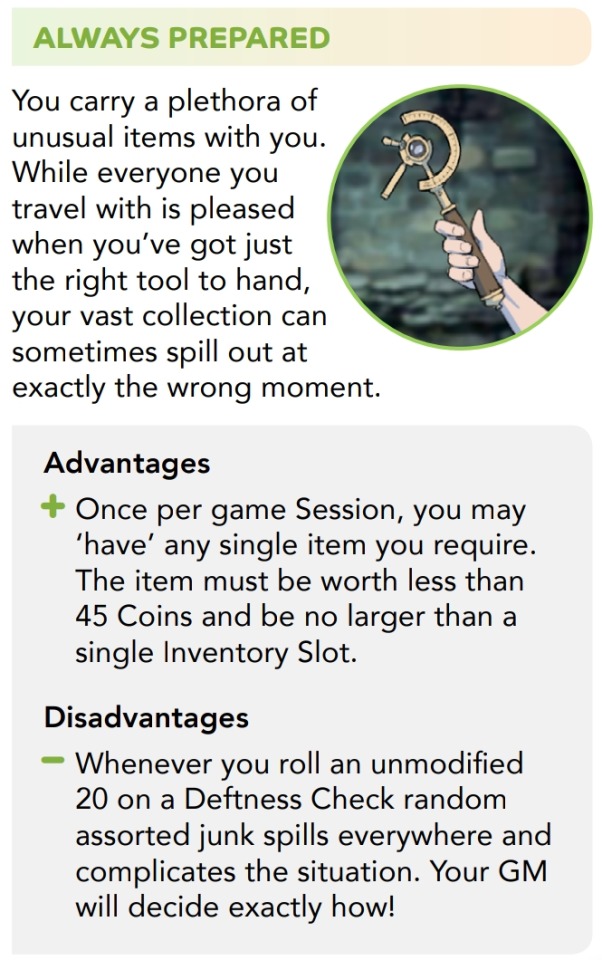
74 notes
·
View notes
Text

ohhhhhh I need to take a fucking walk
Nevermind that this literally conflicts with information we get in game (Lucanis states he does not control Spite’s wings, which unfurl in the romance scene) but this is such a terrible answer.
(Not the subject of this post but re: Vorgoth god I hate it so much when creators are like ‘oh stupid horny fans want to fuck anything’ maybe fans like interesting characters? It’s so judgemental.)
1) Anders/Hawke/Justice was hugely popular after DA2. A big criticism from the fans of them was that Justice wasn’t involved in the relationship enough. How is it surprising that people would be interested in Spite’s role?
2) Solas is ALSO A SPIRIT/demon but solavellan fans aren’t treated like freaks for liking him;
3) You have spent four games establishing spirits have agency, deconstructing the Chantry narrative that spirits are one dimensional beings undeserving of respect, and emphasizing that should be treated like people.
4) Lucanis and Spite share a body. They are going to be sharing a body for the foreseeable future. It is so boring to just say “oh spite leaves” and that he has no say in the relationship. It completely undermines the ‘spirits are people too’ thing. You had such an opportunity to explore a different and unique dynamic, and explore the challenging questions that sharing a body would raise. But no, Spite wanders off.
5) What do you mean he wanders off? The whole problem is that Spite CAN’T leave? HE WANDERS WHERE, JOHN?
6) It was a “consistent topic of discussion.” Well. If only there was some way. That the player. Could make the decision. About how present Spite is. In the relationship.
#epler when I get you#DAV critical#spite dragon age#rookanis#I’m going to blow a fucking gasket#spite get behind me#I thought the vorgoth bit was in reference to spite at first
95 notes
·
View notes
Text
One of the things that has made Dragon Age a compelling, interesting series is that they haven’t (in the past) shied away from giving complex conflict to and between characters that you’re intended to like. Good people had bad politics, sheltered people parroted what they had been taught, traumatized people lashed out at friends and everyone carried biases with them. I can see where they wanted to balance the deep hopelessness of the adversaries of Veilguard with something lighter between your teammates and allies, but it just makes everything feel like all the corners have been rounded down so we don’t hurt ourselves. Never putting the player in a position to compromise on a moral stance is more than a question of player agency (a point of criticism that I think is asinine at best); by never presenting the factions as thorny, difficult, suspect, of dubious means, you preemptively take the teeth out of any point you are trying to make. You prevent yourself from being able to offer critique of a position by never letting any character hold it legitimately. And the world you operate in ultimately becomes a singular texture, a dull simplicity of with-or-against us, and significantly reduces the ability to challenge the player’s own internal biases.
#dragon age#bioware#dragon age the veilguard#text post#datv#dragon age inquisition#da2#dragon age origins#dai#veilguard critical#but in a media way#help her she’s stewing again
73 notes
·
View notes
Text
System Overview: PARAGON.
For three weeks, I’m exploring various ttrpg systems and what makes them tick, as per what was voted on in this poll. This week I’m going to dive into the PARAGON system!
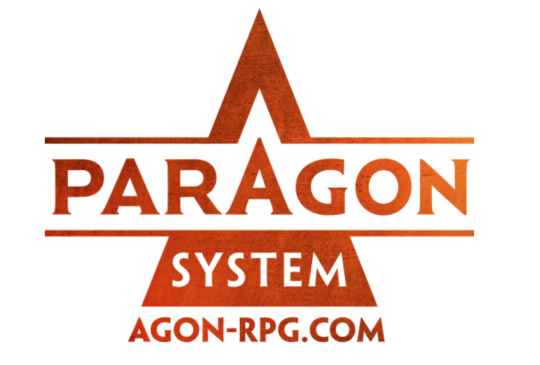
The PARAGON system feels very distinct in comparison to many other modes of play, because of the way it uses its dice. In many roleplaying systems, whether it be a serial investigation, a high-action combat, or a social intrigue, dice rolls are attached to discrete, individual actions, setting up beat-for-beat sequences. In PARAGON, however, a single dice roll can determine the results of an entire scene, dictating the results of an endeavour for a whole party. This can lead to a dramatic reduction of rolls, and the ability to navigate entire thematic arcs in a single session.
How does PARAGON accomplish this? Well, let’s look a little closer.



Agon by John Harper (mythic greek heroes) / Surge Protectors, by Sean Nittner (Transformers-inspired Earth defenders) / Chamber, by John Harper (super-secret agency dealing with an alien paranormal phenomenon)
Character Creation & Traits.
The names change depending on the setting, but each character has elements of themselves that are translated to different-sided die. In AGON, a character’s Epithet describes something about them that sets them apart from other heroes. In Surge Protectors, the Epithet is replaced by your Vehicle Form.
Characters also have Domains which represent areas of talent or expertise; these are broad categories that delineate different approaches the protagonist might take to solve a problem. In Endeavour, a sci-fi play-set inspired by Star Trek, these Domains are: Leadership & Negotiation, Science & Medicine, Operations & Engineering, and Strategy & Tactics. In CHAMBER, a play-set about sci-fi intrigue, these Domains are Advanced Systems, Applied Dynamics, Human Factors and Noetic Vectors. When choosing these domains, one Domain will be favoured, and the size of the die will increase from a d6 to a d8.
What changes the most might be the category called Divine Favour in AGON. I’d describe this category as the special genre-appropriate ways that your characters may be differentiated by each-other. In AGON Divine Favor reflects the blessings of various gods for your characters. But this could also represent different personal strengths, alliances with various civilizations, special weapons or subsystems, and so much more. The number of options here also varies, depending on what’s thematically appropriate - in AGON, since there are many Greek Gods, you can choose from the most commonly listed, or choose to gain Divine Favour with a minor god, as long as you can determine what special strengths that god can give you.
You’ll also create bonds between each player, a relationship that can be used during times of conflict and can represent the connections between the members of the party. If you use a Bond with another character, you can add a copy of their Name dice to your dice pool.
All of these pieces of your character, from their Name, Title, Domain, to their special mechanic, provide an extra dice to roll. Depending on the nature of the trait, the dice size will be larger or smaller, and you can increase the size of the die as your character gains a legacy, a reputation, or an increase in skill. From there, we move on to the Trial.
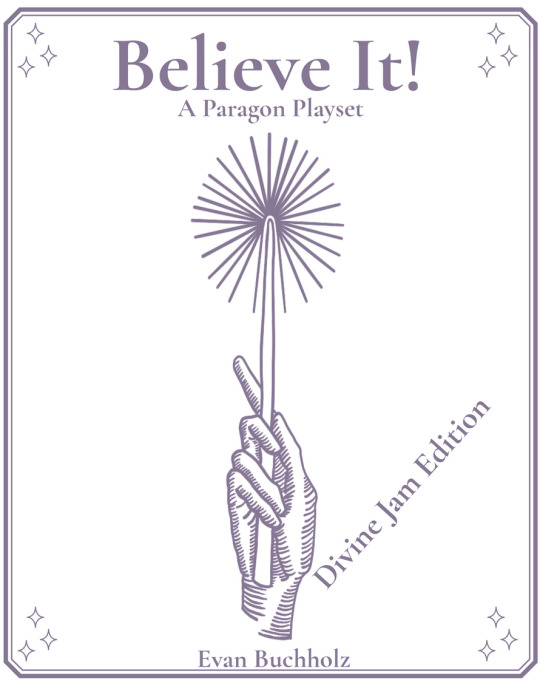
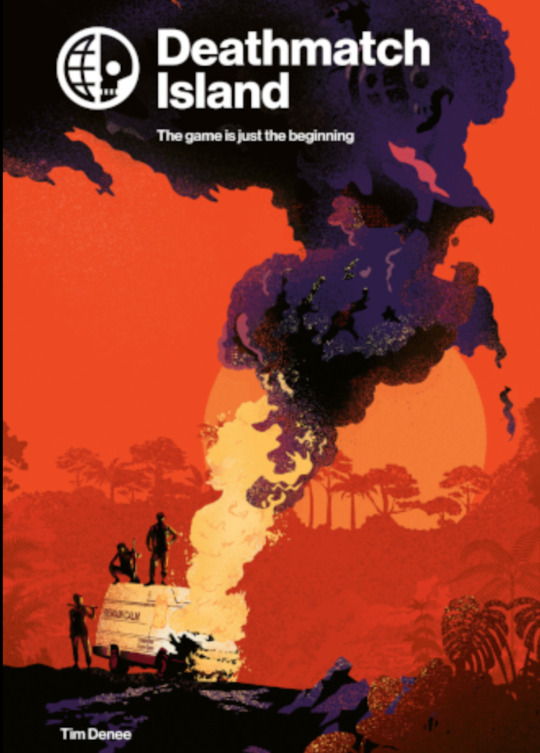
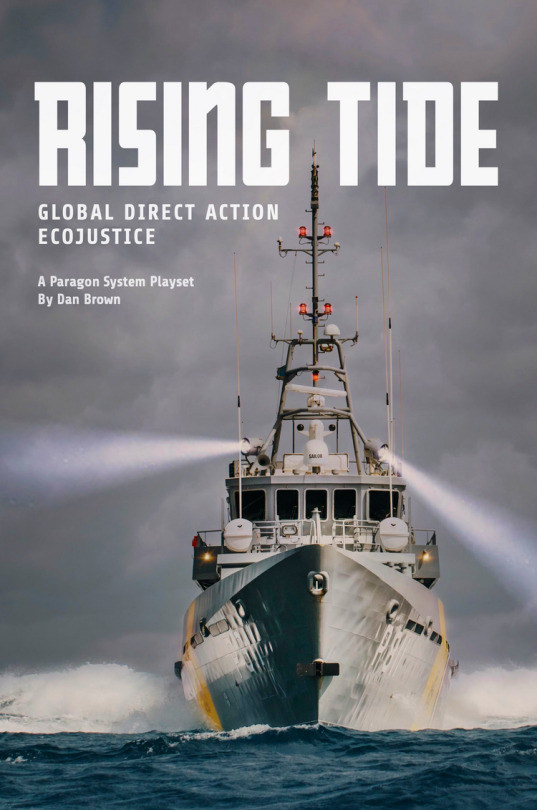
Believe It! by Evan Bucholz (apprentice mages) / Deathmatch Island, by Tim Renee ( deadly game show ) / Rising Tide by Dan Brown ( eco-justice rebellion)
Trials.
Any given conflict in a PARAGON game results in something called a trial - a single-roll dice mechanic that determines the actions and outcomes for everyone involved. This trial can be combative, but it doesn’t have to be - all participants may be competing against each-other, or some participants may facing against others.
When a trial is announced, the table has a conversation about what they want to accomplish, and how they want to approach the problem. The Strife Player, who has a role close to a GM role in PARAGON, will determine which of the four Domains matches the group’s approach. All participants must use the same Domain. The Domain chosen will determine which dice each player will roll.
For most trials, the Strife Player will embody an opposing force, often (but not always) an antagonist. To begin the trial, they will roll the dice associated with the antagonists’ dice pool, often a number of dice associated to Names, and descriptive traits, such as Monstrous, Deceptive, etc. Antagonists can often have higher dice than PC’s, or special abilities that grant them extra dice to roll.
The Strife Player rolls the antagonizing dice pool before any of the players, and locate the single highest dice. They will add a modifier based on Strife, which represents the current conflict, and use the result to define the target number for the contest. Players will then pick up their Domain dice. They will also have the opportunity to add to their dice by using thematically appropriate elements of their character sheet. This might be an alliance that is useful to you, a reputation you have, a relationship, or using a special resource to add a second Domain of yours to your dice pool.
If you don’t think your character would participate, or if you’d rather contribute in another way, your character can choose to sit out and provide support to another player. Your Domain die is added to your ally’s dice pool, and you earn a Bond with that player.
Once everyone has assembled their dice pools, the party all rolls. Each player adds the two highest dice, not counting d4’s, and then add the results of any d4s that were rolled. This is their player’s highest result.
If your character’s highest result is equal to or greater than the target number, you succeed. The highest total of the group is the best, and gains an extra reward. If a character’s total is less that the target number, they suffer, and potentially fail to contribute to victory. At least one character has to succeed for the group to clear the trial.
After - and only after - all of the rolls have been made and documented, the group can narrate how the conflict played out.
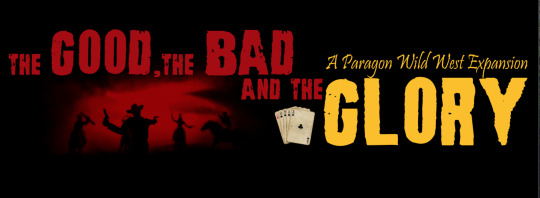

The Good, The Bad, & The Glory, by V2S Games (wild west vigilantes looking for revenge) / Storm Furies, by John Harper (stormcraft fighter pilots patrolling the solar system)
The Narration.
After the rolls, each player takes a turn narrating the actions and consequences that affect their character during the trial. The results of the roll determine whether or not your character fails or succeeds, but how they fail or succeed is still up to you. Depending on what you use in building your dice pool, you may have some clues as to what your scene looks like - if your character is known to be quick-witted, you might include a detail that shows how they use their wits to react, or if they have a relationship that they lean on, you might describe how they depend on a memory of an intimate moment to give them strength.
The player who does the best will likely get to describe what they do to deal the final blow, or clear the obstacle fully. A player who fails may describe what they attempt to do, and also how they fall short. Finally, a player who chooses to provide support instead of roll can describe what they do to boost a teammate.


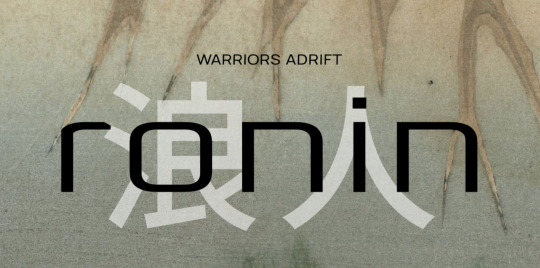
Ares Ascendant, by cosmicbeagle (Martian colonists building a community) / Endeavour by Armiger Games (Star-Trek inspired voyages among the stars) / Ronin, by Hendrik ten Napel (rejected samurai trying to regain their honour)
The Extras
There’s a few extra pieces that fill out a session of a PARAGON game. This includes mechanics called Glory, Pathos, Fate and Boons.
Glory is meant to represent your reputation, or legend - what you’ll be remembered for. In Ares Ascendant, this is your Renown, which determines how much weight your character’s political views will have in the Martian colony that you are attempting to establish.
Pathos is a resource that can be spent to give you an advantage, but pushes you closer to Agony, which is meant to represent an ending for your character, and probably an unhappy one. Whenever you enter Agony, you mark a point of Fate; your track that determines how long your character’s story lasts. In Ronin, which is a play-set which is about shamed samurai attempting to regain their honour, Pathos & Agony are relabelled into Perseverance and Suffering, while Fate is called Karma.
Boons are another measure of character improvement, gained when you reach specific marks on your Fate track, as well as whenever your crew reaches specific milestones applicable to your play-set. These boons usually involve increasing the size of one your dice, or adding another resource from which to pull dice. Advanced boons may give you benefits when you act in a supportive role, or allow you to roll extra dice on special rolls. In Rising Tide, the play-set of global eco-justice, the Fate track is replaced by Dedication, and Boons are simply called advances.


Vatborn to Kill, by Adam Schwaninger (sci-fi military in an unending war) / Sea Kings, by Luke Edgemon (magical pirates)
Final Thoughts
One of the strengths I think the PARAGON system carries is the way it flips the pattern of play, allowing players to roll the dice before they describe what they do. This can be immensely useful for folks who are newer to role-play, as it allows them to play strategically and then build up a story based off of the pieces they choose to engage with.
If you decide that your character is sturdy, crafty, and good with tools, you’ll probably choose a lot of traits and abilities to describe that. Then, when you enter a contest, you can pull from those abilities, and decide how they come into play after you roll. This means that creativity isn’t required in order to play effectively; instead it can be learned, and filled in after you know whether or not you achieved success.
Now for a few final recommendations!
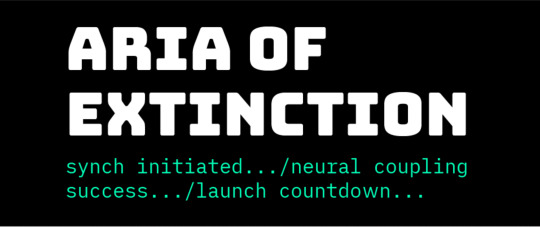
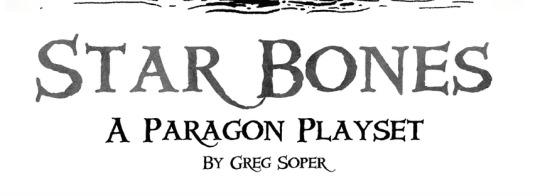


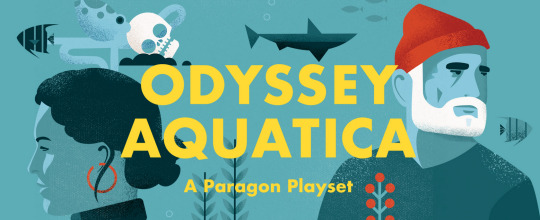
Aria of Extinction, by Greg Soper, is a game about mech pilots fighting post-apocalyptic monsters.
Starbones, also by Greg Soper, is a game about mystical pirates looking for treasure.
Ruins of Doom, by Matteo Sciutteri, is reminiscent of OSR fantasy dungeon crawlers, meant to be low-magic and full of brutality.
Baka Mitai, by ¡Hipólita!, is a city-pop, Yakuza-inspired playset about trying to survive in the entertainment district of Tokyo.
Odyssey Aquatica, by Old Dog Games, is a 1960's oceanographic playset about conducting research and rescue operations out on the open sea.
You can see my full PARAGON collection on Itch.io here!
If you like what I do and want to leave a tip, you can always stop by my Ko-Fi page.
44 notes
·
View notes
Note
Oh no. Sir I believe I'm going to need you to explain that Dragon Age 2 opinion, that is a BLAZING hot take
I really don't think it is. Although of course all of this is personal opinion, not some sort of divine proclamation on high about which video games people are allowed to prefer, so take please it in the spirit it is offered.
Origins is a worldbuilding walking tour as much about explaining its own in-universe lore and fantasy history as it is about either its characters or the actual story that is happening in the game. It's a cool world! With some great lore! But also it is built entirely around Generic Fantasy Plot Structure #1 and never particularly seems interested in innovating, or surprising the player. On top of which, a lot of its setting and lore is pretty weakly sketched and doesn't really get developed into something either visually or narratively compelling until it gets built out in later games.
And while Inquisition has some genuinely fantastic characters, everything else about the game suffers very badly from the plague of BioWare Magic™, i.e. the production was an absolute mess up until the last minute when five hundred extremely overworked and underpaid creative geniuses somehow managed to wring a functional experience out of the trainwreck. It was made with fucking Frostbite of all things, jesus christ, it's holding together with spit and duct tape.
Now, Dragon Age 2 shares a bunch of the problems of Origins and Inquisition. It too bears the hallmarks of "our executives couldn't plan a healthy game production cycle if their lives depended on it" with a lot of unfinished content, half-assed sidequests and a truly frustrating over-reliance on a combat system that isn't half as engaging to use as it needed to be.
But Dragon Age 2 also has something neither of its siblings could ever even hope to match: an actual compelling protagonist.
Like, listen, I know people adore their headcanons about their Wardens and Inquisitors, and it has made for some truly amazing fanworks, but Hawke is literally the only actual character out of all of them. Hawke has conflicts, problems, needs and drives that actually inform and push the story forward, they have a family and a history and a reason to give a sh** about the central conflict of the narrative.
In Origins and Inquisition both, your character becomes the main character of the story entirely because of fate and random chance. You are the Chosen One and you are the only one who can Save The World because you're the last of the super special elite fantasy Hero Squad, or because you got some green magic stuck in your hand by being in the wrong place at the wrong time. Because the character is a complete blank slate onto which the player is expected to project themselves, random chance and circumstance are the only tools the plot can use to position them as main characters. There is no character to drive them to it.
In Dragon Age 2, Hawke becomes the champion because they're trying to build a new life for their family in Kirkwall, and end up embroiled in the chaos and politics that befall the city as a natural consequence of living in it and dealing with the conditions of it. Hawke and their family's needs and wants drive their actions, and push them to engage in endeavors that influence the course of history. They have agency (in the conceit of the narrative, at least) over how their life turns out, they make choices that have consequences, rather than being dictated into the position of Main Character by a literal looming apocalypse that permits no other course of action.
And I'm not about to sit here and claim that Dragon Age 2's story is perfect or that every character is a masterpiece or that every plotline is amazing. No, there's plenty of scuff and jank and things that have aged poorly and unresolved plot threads and all the rest of it.
And I am definitely not forgetting the godsdamned DLC where BioWare threw it all overboard by inventing a Special Bloodline Plot where oops it turns out Hawke actually IS a special chosen one specially chosen by a special fate to have a special role in Saving The World because they're special because of fate and destiny and blah blah, I still think that was phenomenally stupid (especially when Corypheus wasn't even Hawke's goddamn main villain to deal with what was any of this supposed to add to their character ffs BioWare)
But even with all its problems, the simple fact that Hawke is a character you can give a shit about independent of your own projection as a player - the fact that Hawke isn't just an empty bland blank slate with no personality, no traits, no wants or needs or drives - that has made Dragon Age 2 infinitely more memorable to me than either Origins and Inquisition. I think about it to this day. I think about Hawke to this day. I care about what happens to the character in a way that I just simply could never bring myself to do with either my Wardens or my Inquisitors.
212 notes
·
View notes